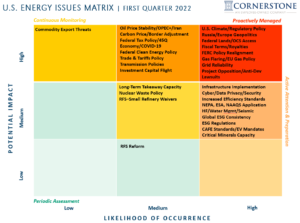Energy issues are dominant in the headlines as natural gas supply impacts geopolitics in Europe and Russia threatens to invade Ukraine. High commodity prices also contribute to global geopolitical and economic uncertainty. High oil, gas and motor fuel prices are hurting consumers, contributing to overall inflation and becoming an election year issue.
In the U.S., the Biden administration is working to assure that volumes of liquified natural gas (LNG) will be made available to natural gas-starved Europe. At the same time, climate-related regulatory policies have made oil and gas leasing on federal lands more difficult, and a federal court has invalidated offshore federal Lease Sale 257. The process for the next Bureau of Offshore Energy Management five-year lease sale process is not yet under way with the current plan due to expire this summer. Climate-related considerations are also impacting approvals and decisions being made at the Federal Energy Regulatory Commission (FERC).
The passage of the Infrastructure Investment and Jobs Act (IIJA), signed into law late last year is providing billions of federal dollars for grid reliability, critical minerals and supply chains for clean energy technologies, carbon capture and storage (CCS), hydrogen and energy efficiency technology, electric vehicle changing stations and plugging abandoned wells. The Build Back Better reconciliation package that would have extended and expanded the 45Q tax credit for CCS and applied a methane fee for methane leakage, failed to pass the Senate, though pieces of the bill may be moving through Congress separately or as part of other legislative vehicles.


